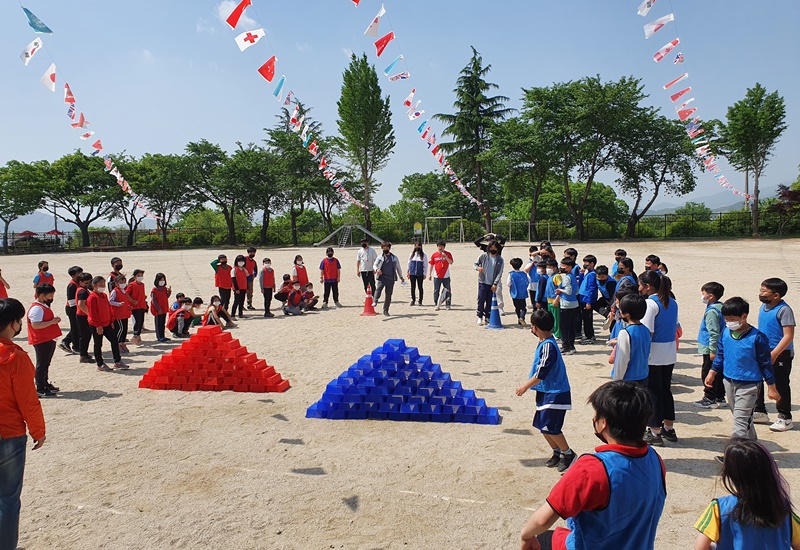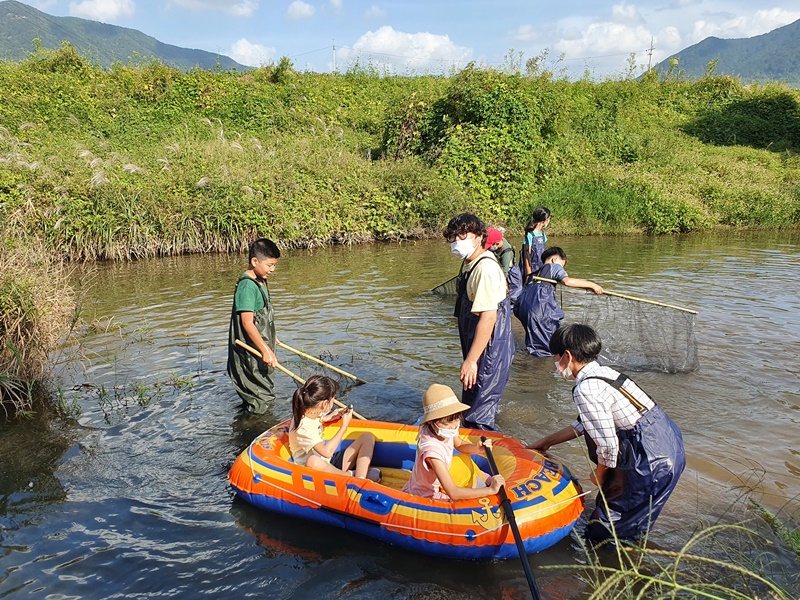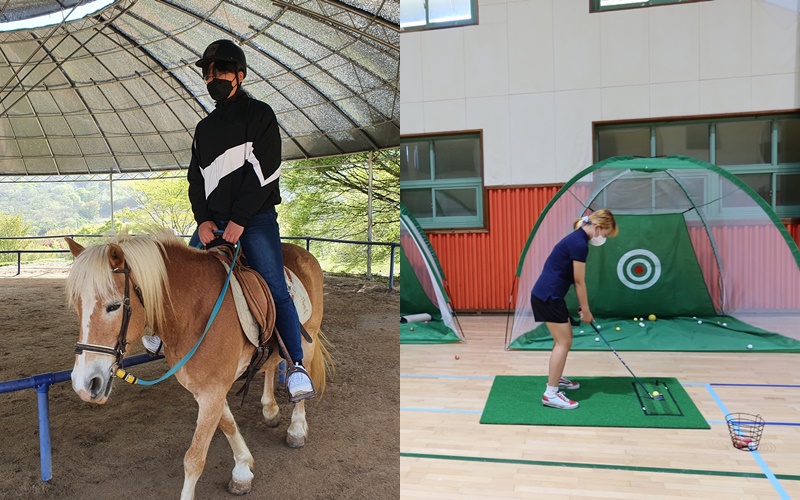
Students at Nagan Elementary School in Nagan-myeon Township of Suncheon, Jeollanam-do Province, play a game in April on the school's field day. (Nagan Elementary School)
By Kim Yeojin and Yoon Hee Young
Fourth grader Lee Seo-ho wakes up in the morning hearing the sounds of birds and bugs. He goes to school seeing colorful flowers and green trees on mountains and in fields, breathing fresh air.
A student from Seoul, Lee in March transferred to a rural school in Suncheon, Jeollanam-do Province. Watching him taking online classes all of last year, his mother opted to have her two children study in the countryside.
His mother Kim Hye-hee said, "Even when the children could go to school for the first time in a long time, they couldn't talk to friends and had to eat lunch behind partitions, which is depressing."
This family is not the only one interested in staying in rural areas amid the COVID-19 pandemic. Yun Si-hu, a fifth grader, transferred from Seoul to Woldeung Elementary School in Suncheon through a government program for placing students in rural areas to attend school.
On her decision to have her child join the program, Yun's mother Oh Su-jung said, "When taking online classes, children did nothing but sit in front of the camera during gym class," adding, "I wanted to let my children play freely in nature."
A combined 147 students from Seoul transferred to Jeollanam-do for the fall semester. In December last year, the Seoul Metropolitan Office of Education and Jeollanam-do Office of Education agreed to launch the program under a working-level accord and pledged to help Seoul-based students transfer to schools in rural, mountain and fishing villages.
Urban students in the program go to rural schools in Jeollanam-do for more than one semester, experiencing change of season in the village surrounded by a natural environment, trying seasonal food and building relationships with neighbors.
Students can either choose from staying in a homestay in a rural household, renting a home to live with family or shacking up at a center run by activists. Lee moved to the country with his mother and sister. His father works in Seoul and joins his family every weekend.
The Seoul and Jeollanam-do offices offer partial financial support for families to study in rural areas. Staying at a homestay or center is normally KRW 800,000 per month but thanks to such aid, parents only pay KRW 200,000. If the whole family stays in the countryside, the offices offer KRW 600,000 for one child studying in a rural area, KRW 700,000 for two and KRW 800,000 for three. The parents only pay rent and living expenses.

Students at Nagan Elementary School in October catch marsh snails. (Nagan Elementary School)
The program has attracted foreign media attention. The Japanese daily Asahi Shimbun in August said the program's purpose is to take a break from Korea's competitive society and the pandemic. The BBC website's Asian news section in June also featured the program in the article "South Korea: Swapping Seoul megacity isolation for village life."
Small schools in rural areas have offered an alternative to future-centric education thanks to the availability of activities amid the pandemic. Schools in the sticks have fewer students and are less affected by the coronavirus than metropolises, whose population density requires social distancing.

Students experience horseback riding and golf. (Left: Nagan Elementary School, right: Kim Yeojin)
When Kim first suggested that her children attend school in rural areas, they said they "didn't want to go" since they had never left Seoul. They eventually agreed to try a new experience and moved to the village. Now, they feel the benefits of living in rural areas and have applied to stay until the end of the fall semester.
Lee said, "I had to attend online classes in Seoul but it's great to go to school here," adding, "I can do afterschool activities with my friends and I recently harvested sweet potatoes, which was a lot of fun."
Choi Hyung-goo, a teacher at Nagan Elementary School, said, "The reactions of children from Seoul are very different from those of provincial students when experiencing rural activities," adding, "Harvesting sweet potatoes, for instance, was a new experience for Seoul students that greatly impressed and touched them."
A big advantage of rural schools is that children can experience nature in many ways. They can play with their friends and fully immerse in nature despite the pandemic.
Yun said, "I can now do every activity unavailable in Seoul such as field days and field trips," adding, "Living here isn't worse than in Seoul at all."
lvzhen@korea.kr